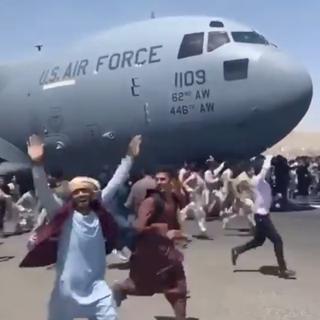


The 2021 US withdrawal from Afghanistan, a solo decision
Series'The Transatlantic Divorce' (4/5). Initiated by Donald Trump in 2020 without consulting US allies, the American departure from Kabul unfolded the following year in apocalyptic conditions as the Taliban retook control of the country, wiping out the effects of two decades of Western intervention.
At the end of 2020, Sir Laurie Bristow received an unexpected offer from his employer, the Foreign Office, to become Her Majesty's ambassador in Kabul. The position was to be filled in June 2021. He asked for a week to think it over.
At 58 years old, this calm-voiced, slender man with neatly combed gray hair had behind him a distinguished 31-year diplomatic career, including a challenging last post as ambassador in Moscow. He knew Kabul had become one of the world's most dangerous cities. The Taliban were gaining ground toward the capital, from which they had been ousted nearly 20 years earlier by a United States-led coalition in which his country participated.
He suspected his mission would be intense and likely involve closing the United Kingdom's embassy. On February 29, 2020, President Donald Trump signed an agreement with Taliban representatives in Doha, Qatar, promising the withdrawal of US and NATO forces from Afghanistan no later than May 1, 2021.
Rapid acceleration of evacuations
Bristow accepted, of course, after consulting his wife, who not only did not try to dissuade him but asked if she could accompany him (the answer was no). "Someone had to do it," he wrote in an account published in 2024, Kabul: Final Call. He would become the last British ambassador to Afghanistan, after a mission lasting 11 weeks. Shorter and even more dramatic than he had imagined.
In the footsteps of his French counterpart David Martinon, who arrived in 2018 and published his firsthand account in the 2022 book Les 15 jours qui ont fait basculer Kaboul ("The 15 days that changed Kabul"), Bristow described from the inside the extraordinary tension during those summer weeks. The Westerners realized they had to suddenly speed up evacuations, both of their own nationals and of Afghans who had worked with them for 20 years, because the Taliban were rapidly reclaiming the country. Cities fell one after another, inexorably. Soon, it was Kabul's turn. The coalition-trained army collapsed. Without warning, the Western-backed president, Ashraf Ghani, fled to the United Arab Emirates by helicopter.
You have 79.94% of this article left to read. The rest is for subscribers only.
